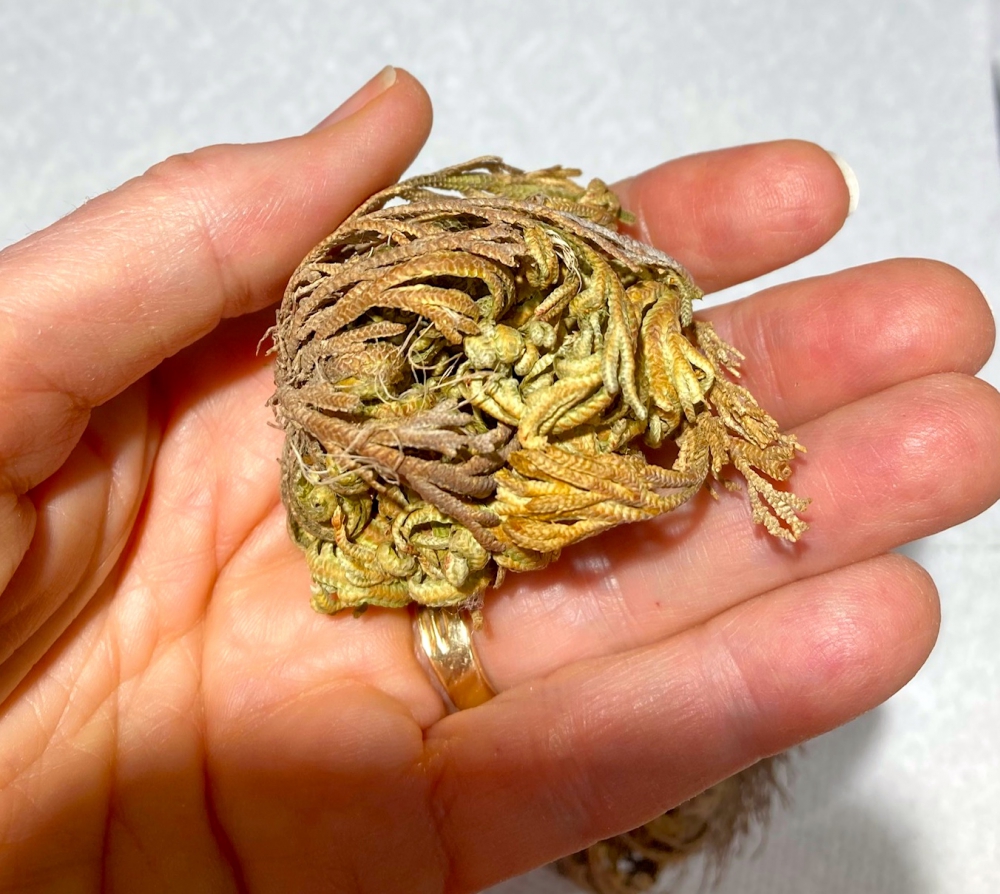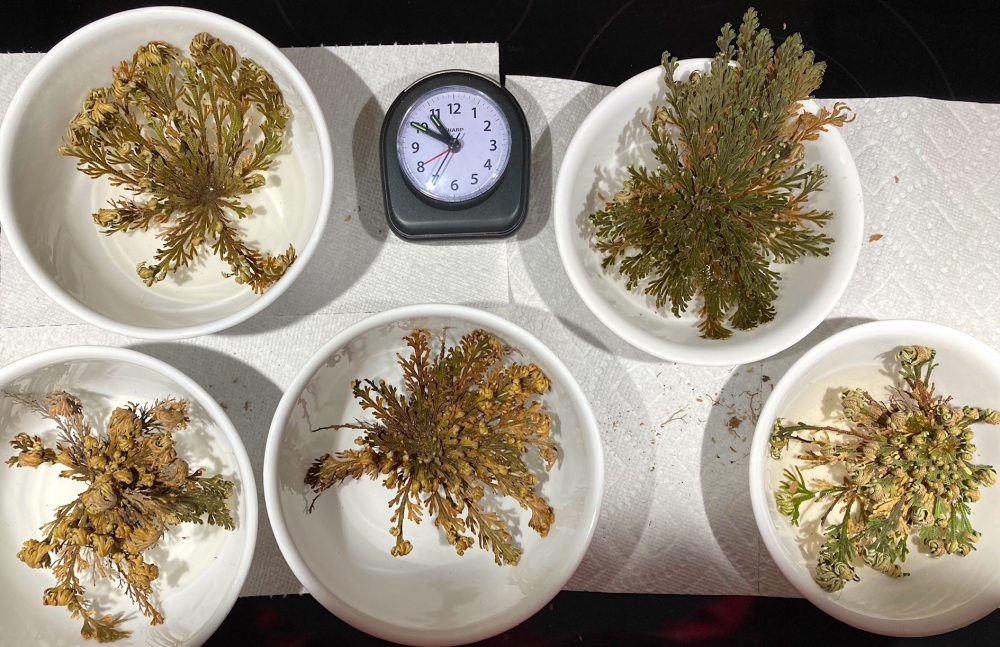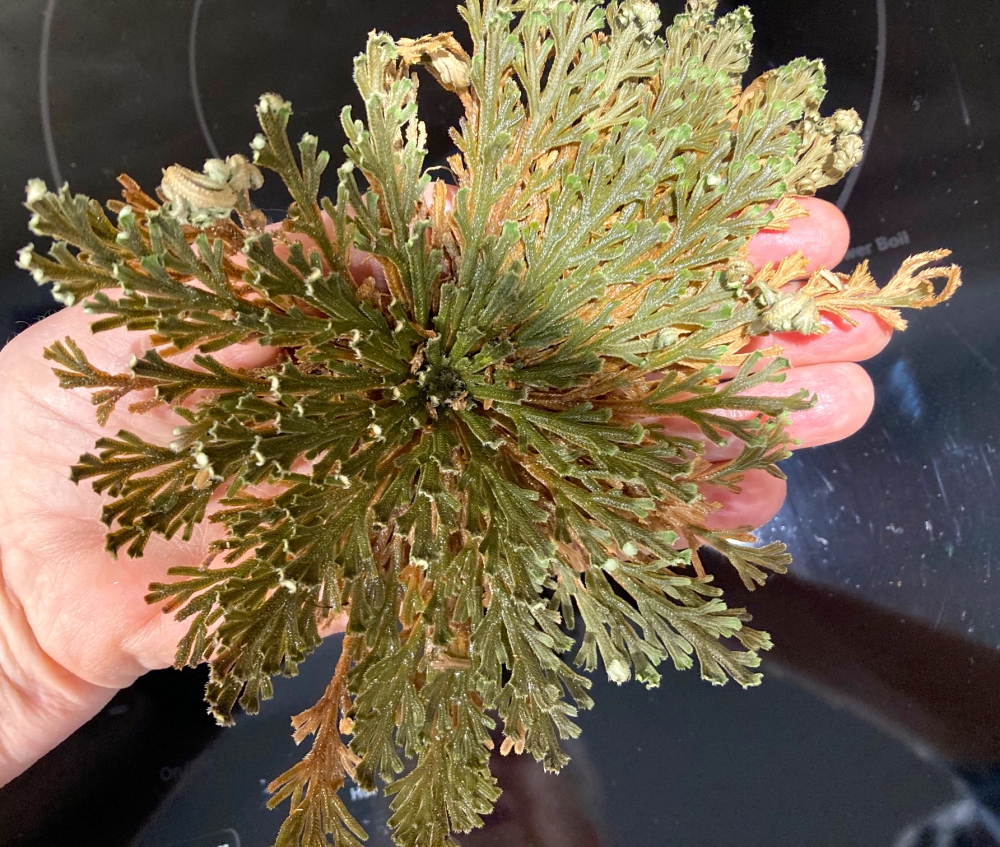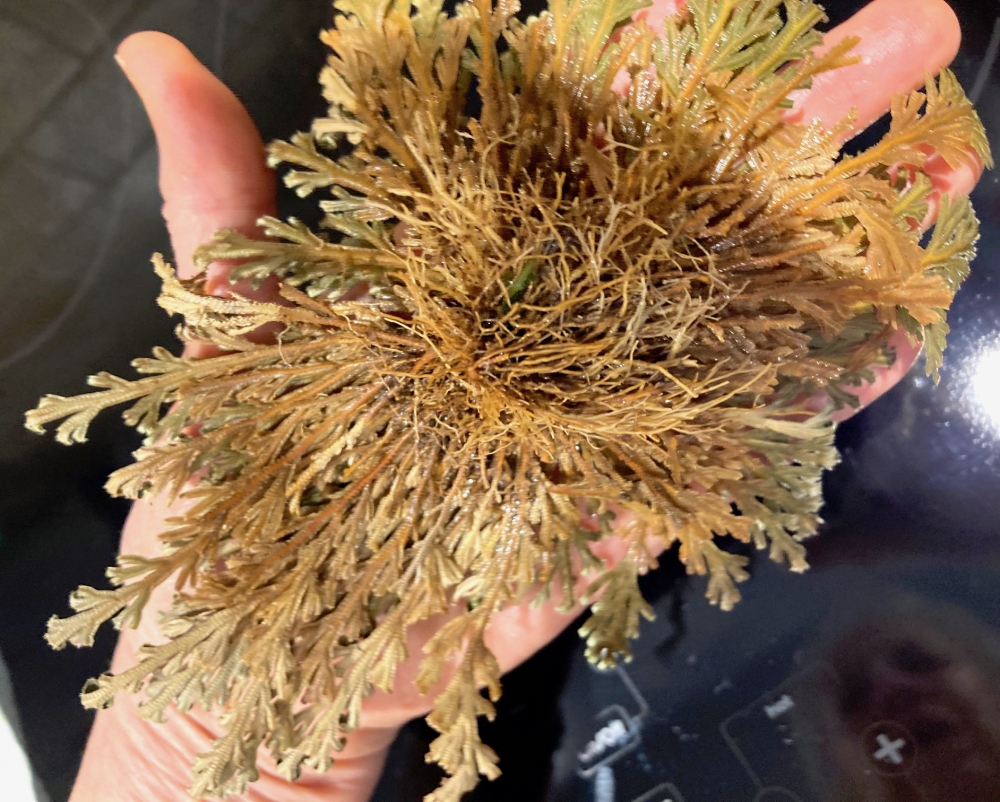
Blogs
The Resurrection Plant
Tuesday, March 12, 2024 by Phyllis Smith Kester
 Surprise! I discovered some dried-up “resurrection plants” in a plastic container while cleaning out the top storage area of a cabinet that had survived several moves without much disruption. I acquired them years ago when I helped my mother dispose of some of her stored things in the late 1970s. She had used these popular plants in her Kansas classroom for years. While my sons were young, I used them to illustrate how something “seemingly dead” could be renewed in mere hours. It was fun adding water and watching them come back to life.
Surprise! I discovered some dried-up “resurrection plants” in a plastic container while cleaning out the top storage area of a cabinet that had survived several moves without much disruption. I acquired them years ago when I helped my mother dispose of some of her stored things in the late 1970s. She had used these popular plants in her Kansas classroom for years. While my sons were young, I used them to illustrate how something “seemingly dead” could be renewed in mere hours. It was fun adding water and watching them come back to life.
I wondered—could seemingly dead 50-year-old plants be resurrected to life again like they did when younger? I had to give this a try. But—just in case—I ordered a new plant to compare as I try to renew or “resurrect” them.
The “resurrection plant,” or Selaginella lepidophylla, looks a bit like a fern. However, it is often confused with the “true” Rose of Jericho plant native to western Asia--where Jericho is located. My “false” Rose of Jericho is different and native to the Chihuahuan Desert in northern Mexico and the southwestern United States—a long way from Jericho. To add to the confusion, both Rose of Jericho plants are called “resurrection” plants, and their pictures are often mixed on the internet. I have the more popular one, which is native to North America.
If you search the internet, you’ll find strange legends and beliefs about this simple desert plant, probably because this unique plant can tolerate severe dehydration but cannot maintain water content. They form a ball and appear dead when they dry out (go dormant); then, they return to life (or resurrect) when making contact with moisture. It doesn’t need to be planted in soil to resurrect. The dried plant can be uprooted, dislodged, and blown around like a tumbleweed, only to open up again whenever it comes into contact with moisture. It’s sort of like a dry sponge getting in the water. It could be weeks, months, or years between opening up from moisture contact. But—will it still open to moisture after 50 or more years?
I have a problem with the common name of this plant. Technically, it is not resurrected because it was not dead, only dormant. Scripture states that Jesus was the “firstfruits” (1 Corin 15:20-25) of the resurrection of the dead. When Jesus returned to life from his death on the cross, his resurrected body was different because he could appear and disappear at will (Luke 24:31, 36-37, 51; John 20:19-20). He also ascended into heaven in his resurrected body (Acts 1:6-11)—never to die again. Lazarus came back to life in the same earthly body, only to have to die again—so I would call Lazarus more of a resuscitation than resurrection (John 11:21, 38-44, John 12:1-2, 9-11). Hence, I would argue this plant should be called the “resuscitation plant” instead of the “resurrection plant.”
But I digress.
Upon careful examination, I discovered I had three old plants, and the new one I ordered turned out to be two. I placed all five plants in small bowls with 1/2 cup of distilled water each to see what would happen. I added about 1/4 cup of water as they soaked it up. After several hours, they had all opened up, even the old ones—although not with as much vigor. I’ve shown three old ones (on the left) and two new ones (on the right) so you can see for yourself. One picture shows the five at the beginning when dry, and the other is 14 hours later with them fully opened.
.jpg)

The three older ones didn’t seem as green, but I don’t know what that means. Honestly, I’m amazed at how the old ones responded. Later, I set them on a table in bright indirect sunlight to see if they all green up more. They did, but the newer ones were much more than the fifty-year-old ones. The other pictures show one of the new ones in my hand to show you how large it is and turned over so you can see the small roots.


This experiment reminded me of how vital water is for our earth and our way of life. About 71% of the earth’s surface is water, and most of the human body is water, with our body being, on average, about 60% water. Water is critical for our survival, and a person can survive without water for only about three days, although various factors can affect this. Hence, I am astounded I could “resuscitate or resurrect” my old plants after they were without water for fifty or more years.
As I checked on the five plants hourly over the course of that first day, I began realizing that there was a spiritual analogy to what I was watching. I know I can feel shriveled or dried up—like these plants were initially—if I have not been meditating and “soaking” in God’s Word daily. Scripture—like water—also gives life and revitalizes me more quickly than water brings these plants back to vitality. I wonder if I should place one of these dried plants beside my Bible to ensure I don’t forget this lesson.
Comments
Linda From Lynchburg At 3/12/2024 11:29:23 AM
Amazing! The analogy is beautiful and so truePeggy Holcomb From Ft worth, Texas At 3/12/2024 11:13:51 AM
Makes me want to find one of the plants. That is amazing that the old ones would still respond to being wateredHelen Ann Spessard From C312 WCL At 3/12/2024 9:38:58 AM
I love this account of your magical plants Phyllis. I'm glad that I had the opportunity to see this action in person.Reply by: Phyllis
Me too!Previous Posts
Singing
Phyllis Smith Kester
6/3/2025
Dreaming
Phyllis Smith Kester
5/21/2025
Tornado Alley
Phyllis Smith Kester
5/5/2025
Geodes--Part 2
Phyllis Smith Kester
4/23/2025
1940s in Oklahoma
Phyllis Smith Kester
4/8/2025
Buel Overcomes Adversity
Phyllis Smith Kester
3/24/2025
Buel Smith & Pitchers
Phyllis Smith Kester
3/11/2025
Remembering Grandpa Smith
Phyllis Smith Kester
2/26/2025
Meeting Corrie ten Boon
Phyllis Smith Kester
2/10/2025
Walking the Plank
Phyllis Smith Kester
1/28/2025
Train Ride in a Flood
Phyllis Smith Kester
1/13/2025
Saltillo Surprises
Phyllis Smith Kester
1/1/2025
Connecting Two Pictures
Phyllis Smith Kester
12/18/2024
Kintsugi Brokenness & Beauty
Phyllis Smith Kester
12/3/2024
Capillary Action
Phyllis Smith Kester
11/20/2024
A Forge and Anvil
Phyllis Smith Kester
11/5/2024
Tree Analogy #5-Bloom
Phyllis Smith Kester
10/24/2024
Tree Analogy #4: Brokenness
Phyllis Smith Kester
10/9/2024
Israel and Golan Heights
Phyllis Smith Kester
9/25/2024
Tree Analogy #3: Bent Tree
Phyllis Smith Kester
9/11/2024
Lesson From NASA
Phyllis Smith Kester
8/27/2024
Storm Warning
Phyllis Smith Kester
8/14/2024
Tree Analogy #2: Hanging Sod
Phyllis Smith Kester
7/31/2024
Tree Analogy #1: Angel Oak
Phyllis Smith Kester
7/17/2024
The Warning Shot
Phyllis Smith Kester
7/2/2024
Trip's Delayed Surprise
Phyllis Smith Kester
6/18/2024
Antelope Slot Canyon
Phyllis Smith Kester
6/4/2024
The Pioneer Woman
Phyllis Smith Kester
5/21/2024
What is a Woman, a Wife, or a Mother?
Phyllis Smith Kester
5/8/2024
Two Analogies
Phyllis Smith Kester
4/24/2024
Solar Eclipse Analogy
Phyllis Smith Kester
4/10/2024
EASTER
Phyllis Kester
3/26/2024
The Resurrection Plant
Phyllis Smith Kester
3/12/2024
Busted on Pikes Peak
Phyllis Smith Kester
2/27/2024
What is Love?
Phyllis Smith Kester
2/13/2024
Looking, But Not Seeing
Phyllis Kester
1/30/2024
Remembering Christmas 2023
Phyllis Kester
1/16/2024
The Potter
Phyllis Kester
1/2/2024
The Tree Ornament
Phyllis Kester
12/19/2023
Cockapoo Kristy
Phyllis Kester
12/6/2023
Surprises & Obsessions
Phyllis Kester
11/21/2023
Breaking Thru
Phyllis Kester
11/7/2023
Eagles
Phyllis Kester
10/24/2023
Facing Fear
Phyllis Kester
10/10/2023
The Bug-Eyed Monster
Phyllis Kester
9/25/2023
The Flash Flood
Phyllis Kester
9/12/2023
David's Library Book
Phyllis Kester
8/29/2023
Object Lesson: The Leaky Bucket
Phyllis Kester
8/16/2023
Turpentine Creek
Phyllis Kester
8/1/2023
The Surprise
Phyllis Kester
7/17/2023
Small Pleasures
Phyllis Kester
7/4/2023
Are Fathers Important?
Phyllis Kester
6/20/2023
Fathers and Father's Day
Phyllis Smith Kester
6/6/2023
Legacies of my mother, Hallie Hays Smith
Phyllis Smith Kester
5/23/2023
Hallie's Handkerchief Holder
Phyllis Kester
5/9/2023
A Voice from the Past
Phyllis Kester
4/25/2023
Object Lesson: The Crystal Paperweight
Phyllis Kester
4/11/2023
Grandma’s Quilting Bee
Phyllis Kester
3/28/2023
Actions have Consequences
Phyllis Kester
3/14/2023
Hungry Baby
Phyllis Kester
2/28/2023
Married to a Texan
Phyllis Kester
2/14/2023
Charley Kester’s Horses
Phyllis Kester
1/31/2023
Persistence In The Dirt
Phyllis Kester
1/17/2023
Object Lesson: Mushrooms in Our Life
Phyllis Kester
1/3/2023
Trip with Unexpected Twists
Phyllis Kester
12/20/2022
Grandma’s Important Legacy
Phyllis Kester
12/6/2022

